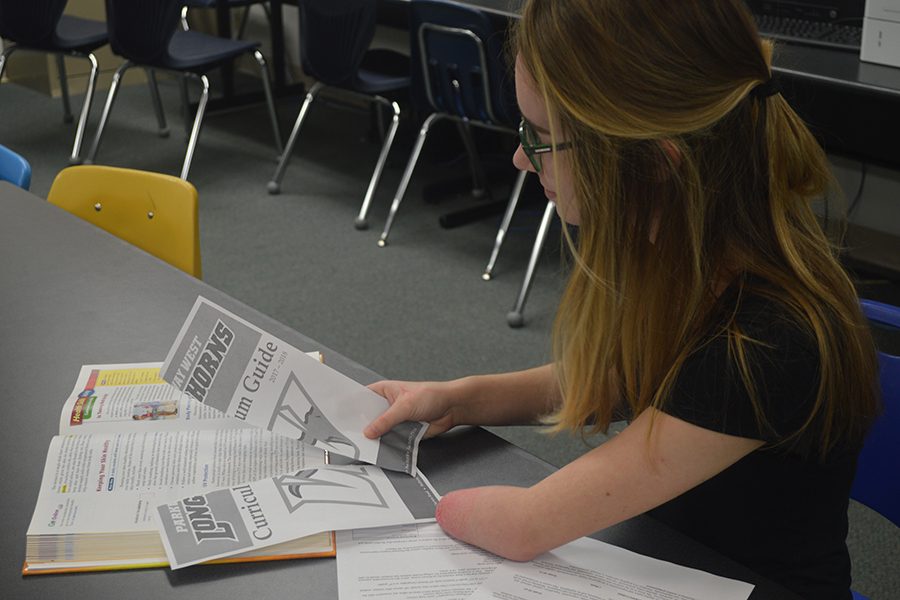For most, the biggest challenge of childhood is winning a game in gym class or trying the convince your teacher to give you extra recess.
While middle school places more emphasis on academics, the future is still clouded by hall passes and hand-raising. Once the transition is made from eighth grader to freshman year of high school, all youth seems to dissipate.
Suddenly the only thing on everyone’s mind is the amount of time before college—at least according to teachers. Starting on the first day of high school, students are flung straight into the adult world with no safety net. In the blink of an eye, juvenile issues and classroom antics become a matter of changing your life forever. This expectation placed upon underclassmen to make important life decisions in their first few years of high school, that will influence their future, is a baneful concept that absolutely must be stopped for the sake of a brighter next generation.
Unfortunately, these negative ideas are enforced before students even hit high school. At eighth grade orientation, the idea of the four-year plan is introduced. Administrators and teachers alike preach this “proactive” method of selecting exactly what classes you will take when for the next four years, claiming that it is a necessity for graduation. They say to choose classes reflective of you future major and career, emphasizing the importance of making choices early.
These choices ultimately have little impact, however, as an estimated 80 percent of students change their major at least once before graduating college anyway. In reality, this restrictive course of action is corrosive, eating away at the imagination and lives of students like cold iron shackles. Despite all of the “helpful planning,” 46.2 percent of polled students still have no idea where they want to go to college, according to a Pathfinder survey. These methods are simply ineffective.
Planning isn’t a bad thing, to be sure. It’s reasonable to have some idea of plans for the future, but expecting 14-year-olds to know exactly where they want to be when they’re productive adults is ridiculous.
Life is full of surprises, and people are constantly changing. If you asked a group of toddlers what they wanted to be when they grew up, you would get a lot of singers and actors. Those are just common answers. Society conditions kids to think or feel one way, then expects them to retain that opinion even when they grow up and have diversifying interests. Forcing teens to make decisions now when they don’t have a common youthful answer to fall back on can result in picking careers that they care nothing about just for the sake of alleviating the pressure.
If we are to protect the futures of students, a few key steps must be taken. First, serious mentions of college must be saved for upperclassmen. They have been through most of high school and have the tools necessary to make a logical decision, unlike underclassmen. This way, the first two years of high school can be spent focusing on high school, the present. The changes in preparation will be enormous with the more time for students to make these choices for themselves. For the sake of a brighter future and less stress for all parties involved, the expectations to have your entire life together by the time you’re 14 must absolutely be dropped.
In short, we’re just too young. Students live a life where they still have to ask to go to the bathroom, yet are expected to select classes reflective of their future careers. Simply put, teens are being babied by adults half of the time, and left out in the cold for the other half. Adults cannot flip flop on whether or not they want to force students into the adult or infant world.



![Sitting courtside before a junior varsity girls’ tennis match, senior Tanisi Saha rushes to finish her homework. Saha has found herself doing academic work during her athletic activities since her freshman year. “Being in sports has taught me how to stay organized and on top of my schoolwork. [With] a busy practice and game schedule, I’ve learned to manage my homework and study time better,” Saha said.](https://pwestpathfinder.com/wp-content/uploads/2025/11/DSC_0022-1200x800.jpg)
![Sophomore Maryem Hidic signs up for an academic lab through Infinite Campus, a grading and scheduling software. Some students enjoyed selecting their responsive schedule in a method that was used school-wide last year. “I think it's more inconvenient now, because I can't change [my classes] the day of, if I have a big test coming and I forget about it, I can't change [my class],” sophomore Alisha Singh said.](https://pwestpathfinder.com/wp-content/uploads/2025/10/DSC_0012-1200x801.jpg)
![Senior Dhiya Prasanna examines a bottle of Tylenol. Prasanna has observed data in science labs and in real life. “[I] advise the public not to just look or search for information that supports your argument, but search for information that doesn't support it,” Prasanna said.](https://pwestpathfinder.com/wp-content/uploads/2025/10/DSC_0073-2-1200x800.jpg)
![Junior Fiona Dye lifts weights in Strength and Conditioning. Now that the Trump administration has instituted policies such as AI deregulation, tariffs and university funding freezes, women may have to work twice as hard to get half as far. "[Trump] wants America to be more divided; he wants to inspire hatred in people,” feminist club member and junior Clara Lazarini said.](https://pwestpathfinder.com/wp-content/uploads/2025/05/Flag.png)
![As the Trump administration cracks down on immigration, it scapegoats many immigrants for the United States’ plights, precipitating a possible genocide. Sophomore Annabella Whiteley moved from the United Kingdom when she was eight. “It’s pretty scary because I’m on a visa. When my visa expires next year, I’m not sure what’s going to happen, especially with [immigration] policies up in the air, so it is a concern for my family,” Whiteley said.](https://pwestpathfinder.com/wp-content/uploads/2025/05/DSC_0077-7copy.jpg)
![Shifting global trade, President Donald Trump’s tariffs are raising concerns about economic stability for the U.S. and other countries alike. “[The tariffs are] going to pose a distinct challenge to the U.S. economy and a challenge to the global economy on the whole because it's going to greatly upset who trades with who and where resources and products are going to come from,” social studies teacher Melvin Trotier said.](https://pwestpathfinder.com/wp-content/uploads/2025/05/MDB_3456-1200x800.jpg)



![Some of the most deadly instances of gun violence have occurred in schools, communities and other ‘safe spaces’ for students. These uncontrolled settings give way to the need for gun regulation, including background and mental health checks. “Gun control comes about with more laws, but there are a lot of guns out there that people could obtain illegally. What is a solution that would get the illegal guns off the street? We have yet to find [one],” social studies teacher Nancy Sachtlaben said.](https://pwestpathfinder.com/wp-content/uploads/2025/01/DSC_5122-1200x800.jpg)

